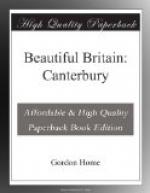So thrilling is the whole story of Becket’s murder that there is every temptation to tell again the tale of Henry II.’s hasty exclamation, and the headlong journey from Normandy to Canterbury made by those four knights whose foul deed history has not ceased to condemn; but for a full account the reader is advised to turn to Dean Stanley’s “Historical Memorials of Canterbury.” It was in the same year and the same month as his death that Becket had returned from exile to Canterbury after an absence of six years, and at the close of a decade of continual struggle with the King. The Archbishop, having landed at Sandwich on his arrival from France, had been received with the greatest enthusiasm, and the people of Canterbury showed their delight in every possible manner. There were imposing banquets, and hangings of silk were put up in the cathedral for the great occasion; but at the end of this December, on the gloomy afternoon of the 29th, the four murderers arrived in the city. The day was a Tuesday, the day on which all the great events of Becket’s life had taken place; for not only had he been born on a Tuesday, but on that day he had been exiled, on that day he had been warned of his impending martyrdom, and on that day he had returned from exile.
[Illustration: The “Angel” Or “Bell Harry” Tower and the baptistery. The massive Norman work is seen here in strong contrast with the lightness and delicacy of the Perpendicular tower.]
While leaving the long story to be told with the amazingly ample detail Dean Stanley was able to employ, one is tempted to quote his account of the first interview between Becket and the four knights, for too often the memory recalls nearly every fact of the murder except the indictment, if it may be so called. The four knights had discarded their weapons and concealed their armour under the cloak and gown of ordinary life on entering the cathedral precincts, so that on their first appearance in the Archbishop’s private room their aspect was sinister without being immediately threatening. Becket had just finished dinner, and was seated on his couch talking to his friends when the four knights were announced, and he pointedly continued, his conversation with the monk who sat by him and on whose shoulder he was leaning.
They on their part entered without a word, beyond a greeting exchanged in a whisper to the attendants who stood near the door, and then marched straight to where the Archbishop sate, and placed themselves on the floor at his feet, among the clergy who were reclining around. Radulf the archer sate behind them, on the boards. Becket now turned round for the first time, and gazed steadfastly on each in silence, which he at last broke by saluting Tracy by name. The conspirators continued to look mutely at each other, till Fitzurse, who throughout took the lead, replied with a scornful expression, “God help you!” Becket’s




